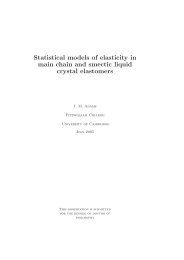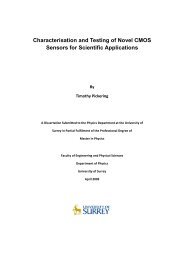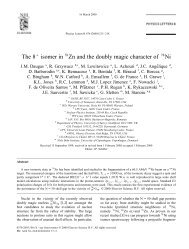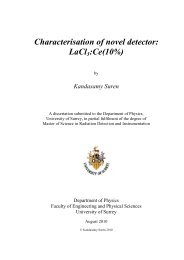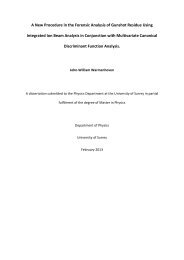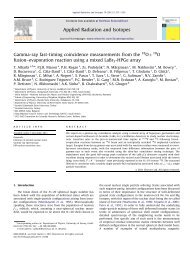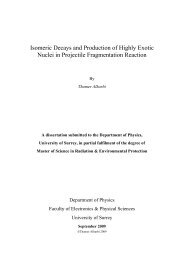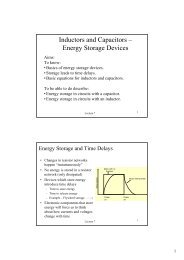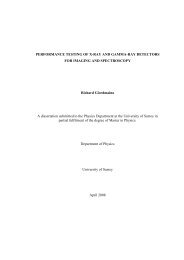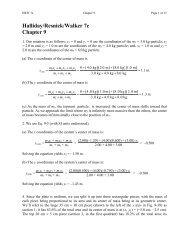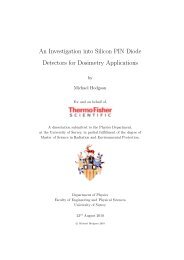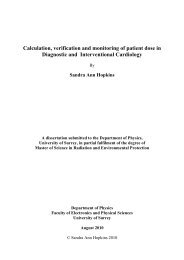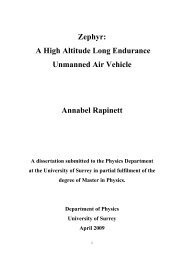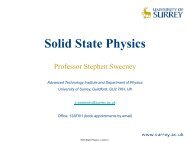Review of Quantum Physics
Review of Quantum Physics
Review of Quantum Physics
You also want an ePaper? Increase the reach of your titles
YUMPU automatically turns print PDFs into web optimized ePapers that Google loves.
16 CHAPTER 1. REVIEW OF QUANTUM PHYSICS⇒ i¯h ∂ |Ψ〉 = Ĥ|Ψ〉. (1.96)∂tFrom this equation we can calculate the time-independent states by assuming that the wavefunctionis <strong>of</strong> the form |Ψ(x,t)〉 = ψ(x)T(t).1(− ¯h2 d 2 )ψ 2mdx 2ψ +Vψ = i¯h 1 T} {{ }Only depends on xdTdt} {{ }Only depends on t= E (1.97)each side can only be a constant which we call E. We thus have two equations) (− ¯h22m ∇2 +V ψ = Eψ ⇒ Ĥψ = Eψ (1.98)E = i¯h 1 dTT dt ⇒ T = e−iEt/¯h . (1.99)The first <strong>of</strong> these is the time-independent Schrödinger equation, and the second tell us how stationarystates depend on time. We can substitute this result into our expansion, as we did in the example atthe start <strong>of</strong> this chapterΨ = ∑ c n ψ n e −iEnt/¯h .n(1.100)Time dependence <strong>of</strong> expectation valuesHow does the expectation value <strong>of</strong> a variable change with time?∂∂t 〈Â〉 = ∂ 〈Ψ|Â|Ψ〉 (1.101)∂t( ) ( )∂ ∂=∂t 〈Ψ| Â|Ψ〉+〈Ψ|Â∂t |Ψ〉 (1.102)} {{ } } {{ }−i¯h ∂ ∂t 〈Ψ|=〈Ψ|Ĥ i¯h ∂ ∂t |Ψ〉=Ĥ|Ψ〉= 1 ) (〈Ψ|ÂĤ i¯h−ĤÂ|Ψ〉 (1.103)= ī 〈[Ĥ,Â]〉 (1.104)hFor comparison we compare this rather compact derivation in Dirac notation to the longer derivationin conventional notation∂〈Â〉 = ∂ ∫Ψ ∗ ÂΨdx (1.105)∂t ∂t∫∂Ψ ∗= ÂΨ+Ψ ∗  ∂Ψ dx (1.106)}{{}∂t}{{}∂tΨ ∗Ĥ=−i¯h∂Ψ∗ ∂tĤΨ=i¯h ∂Ψ∂t∫ −1=i¯h Ψ∗ĤÂΨ+Ψ∗  1(1.107)i¯hĤΨdx= ī ∫Ψ ∗( )ĤÂ−ÂĤ Ψdx (1.108)h= ī 〈[Ĥ,Â]〉 (1.109)h



